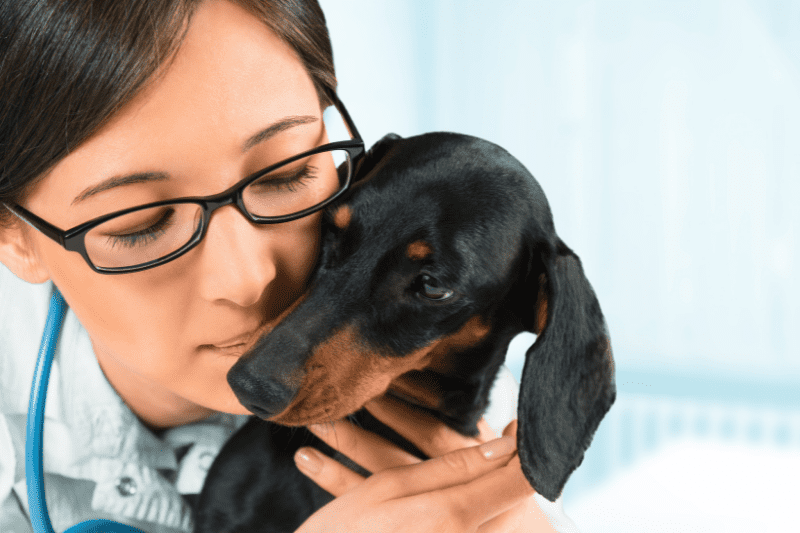
Are dachshunds a healthy breed? That’s a question that many dachshund dog owners ask themselves. The answer, unfortunately, is not always straightforward. Although in general dachshunds are healthy dogs like all pure breeds, they are genetically predisposed to suffer from some health problems.
Dachshunds are prone to certain health problems, and it’s important to be aware of these before you decide to bring a dachshund into your home. In this blog post, we’ll take a look at some of the most common health problems associated with dachshunds and offer our advice on how to keep your pet healthy and happy.
What health issues are dachshunds prone to?
Dachshunds are prone to a variety of health issues, some of which owners should be aware of. Some common health problems include back problems, obesity, and diabetes. It’s important to keep an eye on your dachshund’s weight and diet and to monitor their movements for any signs of back trouble. By being proactive about your dachshund’s health, you can help them stay healthy and happy for years to come.
Related post: Common health problems in dachshunds
Spinal Disease (IVDD)
The elongated appearance of the dachshund’s body is what gives it its nickname of a sausage dog. However, this characteristic that makes it so peculiar also makes them susceptible to suffering from herniated discs or the so-called intervertebral disc disease. Having an elongated spine with short legs puts pressure on the discs.
This disorder causes extremely intense pain to the dog. Simple actions like jumping or climbing a ladder become very painful. Many dachshunds end up needing corrective surgery, and even the use of a special wheelchair for dogs.
Some experts relate this problem to the sedentary lifestyle that dachshunds experience in modern life, where they usually live in apartments with little space for physical activities. However, there are no specific studies in this regard. Despite this, an inactive life would indeed bring your dachshund not only this but also other health problems.
Related post: How do you prevent back problems in dachshunds?
Acanthosis nigricans
It is a skin disease that consists of the formation of grayish and thick wounds, similar to warts, which extend into the dog’s armpits and its perianal area. This type of acanthosis affects dachshunds when they are puppies or young.
The problem lies not only in the appearance that the dog’s skin takes on, but also in that this thickening is accompanied by an infection, peeling, and pruritus. Although there are treatments for the disease, which include everything from hygiene products to medications, when a dog contracts it is for life, as a cure has not yet been discovered.
Related post: How to Deal with Skin Problems in Dachshunds
Dental Issues
Dachshunds have very crowded teeth. These make them prone to build up tartar and debris between their teeth. This not only causes bad breath but also gum problems such as gingivitis and periodontitis.
Gingivitis is the inflammation of the gums due to the accumulation of dental plaque. It is very common in the mouth of any dachshunds that are not subjected to meticulous and frequent oral hygiene. Luckily it’s an easy thing to fix, the inflammation disappears if the plaque is removed.
When gingivitis is not treated, the soft tissue of the gums becomes infected. This causes the bone that supports the teeth to begin to break down. This is known as Periodontitis and causes tooth loss, which is irreversible. We must be vigilant about the dental problems of our dachshunds and make sure that their teeth are always clean. To achieve this you have to take them to the vet once a year for a professional cleaning. In the meantime, you can use products like those offered by Bright to clean your dogs’ teeth easily and conveniently at home. This will also keep our dachshunds from having bad breath.
Related post: Why Do Dachshunds Have Bad Breaths?
Cushing’s Disease (Hyperadrenocorticism)
Cushing’s Disease is a malfunction of the adrenal glands that causes them to produce too much steroid hormone. Cushing’s Disease is a common problem in dogs, and your Dachshund may be at risk. The condition develops slowly over time with early signs being easily missed by owners or even veterinarians without experience dealing directly with this issue on an ongoing basis for years before symptoms become noticeable.
The symptoms include increased appetite, drinking more than usual, and urinating frequently followed by excessive weight gain with an increase in belly fat cell production leading to potbellies. Other symptoms are thin skin and hair loss. This disease has no cure. But there are veterinary treatments with drugs to relieve symptoms.
Obesity
Dachshunds are small dogs with big appetites, which makes them prone to gain weight easily. A balanced diet based on whole foods, combined with regular exercise, is the best way to prevent your dachshund from gaining too much weight. You should also avoid feeding your dachshund human food.
By keeping your dog fit and healthy, you will ensure that his spine does not take any extra stress. Pay attention to any unexpected weight gain, as it may indicate a more serious health problem, such as hypothyroidism. If your dog begins to gain weight, seems lethargic, or is easily fatigued, see your vet as soon as possible to determine the cause.
Related post: Is Your Dachshund Overweight?
Cancers and Tumors
While it is true that the dachshund seems to be prone to developing certain types of cancer, it is also true that the dachshund can develop almost any type of cancer, at any time. Mammary neoplasia, melanoma, and buccal mast cell tumors are among the most common cancers that occur in dachshunds. However, they can also develop other types of cancer, including bladder cancer, lymphoma, testicular cancer, osteosarcoma, and other cancers of specific organs.
The environment in which the dachshund lives may contribute to the development of cancer. Therefore, owners need to keep an eye on their dachshunds to ensure that their health remains as optimal as possible. Problems that can contribute to the development of cancer in a dachshund include heart disease, urinary tract problems, spinal disc problems, and obesity.
Cardiac Disorders
Many dachshunds suffer from heart disease as they age. This condition is called heart valve disease, also called mitral valve disease. This disease occurs because the valves of the heart become weak or deformed and do not work properly. This condition can be treated with medication when diagnosed quickly. To prevent this disease, experts recommend fatty acid supplementation, preventing dachshunds from becoming overweight, and paying attention to dental care. It may sound strange, but experts say that gum problems are related to the onset of heart problems.
Epilepsy and Neurologic Problems
Dachshunds are prone to developing hereditary neurological disorders such as epilepsy. This condition causes excessive convulsions, which can last seconds or even minutes and appear without apparent cause. Due to this condition, dachshunds are prone to brain damage or may have an injury to any of their internal organs during epileptic episodes.
This condition is very dangerous for the life of the dachshunds that suffer from it. But it can be treated with medication. The bad news is that this treatment is for life. Since this condition is not curable.
Eye Problems
The dachshund breed is prone to vision-related problems, and some of these conditions run in their genes. Among them, the most common is Cataracts, which is the appearance of a whitish membrane on the lens, preventing vision. Glaucoma is also very common, which is a sudden increase in eye pressure, that can cause total blindness in many dachshunds, so it must be detected in time.
Progressive retinal atrophy, or PRA, is another of the most common problems for dachshunds. As its name suggests, the disease progresses gradually, characterized by a decrease in vision that, in the long run, prevents the dog from being able to see at night or in situations with low light, which is called night blindness.
Von Willebrand disease
Also of hereditary origin, it is a blood clotting disorder. This disease puts the life of the dachshund at serious risk, as it involves large blood losses. Almost any wound can cause significant bleeding, from an injury to the gums to childbirth, so the dog must be monitored closely to avoid life-threatening accidents.

Are miniature dachshunds healthy?
In general, Miniature Dachshunds are at risk for the same diseases as Standard Dachshunds, and there does not seem to be any disease that affects Miniature Dachshunds more than Standard Dachshunds. However, some experts warn that miniature dachshunds can become obese more easily than standard dachshunds.
This is because Miniature Dachshunds have large appetites and are very good at begging for food. Dachshunds of all types are known for their insatiable appetites. But miniature dachshunds, being smaller, gain weight faster than standard-sized dachshunds. So, it is important to take care of the diet of these little dachshunds.
Related post: Standard Dachshund vs Miniature Dachshund
Do dapple dachshunds have health problems?
Dapple dachshunds are beautiful. Their peculiar multicolored coat gives them a very peculiar and attractive appearance. Dapple Dachshunds are highly prized by dog lovers. What many don’t know is that the genes that cause their coat to look that way also make them susceptible to health problems.
Dapple dachshunds seem to be prone to develop eye health problems, like Progressive retinal atrophy (PRA). In the case of double dapple dachshunds, there is a risk that the genetic mutation may also lead to vision and hearing loss, or even missing or micro eyes.
Related post: What is a dapple dachshund?
What is the most common cause of death for dachshunds?
The dachshund breed, like all purebreds, is genetically susceptible to many health problems. However, most dachshunds reach old age without major health problems. Natural death is the most common cause of death among dachshunds. That is, most dachshunds die old and of natural causes.
Unfortunately, some dachshunds die sooner than they should. The main cause of these premature deaths is cancer. Then follows heart disease and finally the dreaded IVDD. This spinal disease is usually not fatal. But, it can cause life-ending complications for some dachshunds.
What is the life expectancy for dachshunds?
The average life expectancy of a standard dachshund is 15-16 years and 15-18 years for miniature dachshunds. But it is not uncommon for some dachshunds to be quite long-lived, living for more than 20 years.

Related post: Dachshund Feeding and Excercise Guide
How to keep a dachshund healthy
Owning a dachshund is not easy. But seeing our dachshunds happy and healthy makes all the effort worth it. Here are some simple tips to keep your dachshund healthy.
- Good nutrition is very important to keep you healthy, since due to its elongated shape, being overweight can cause injuries to your back.
- Make sure that the dog food you give to your dachshund has good-quality protein. Never overfeed your dachshund, respect the ratio indicated by the veterinarian and the frequency of feeding even when he looks at you with his round eyes that are difficult to resist.
- Keep them hydrated. Dachshund dogs are prone to the formation of urinary and kidney stones, check that their water consumption is adequate and that clean and fresh water is always available.
- Grooming is important for dachshunds, as keeping the coat clean will help prevent skin infections. Also, you can use bath time to inspect your dog’s body for lumps or abnormalities.
- Take your dachshund to the vet for regular checkups. You should also be aware of sudden changes in their weight and behavior.
- Make sure your dachshund gets enough exercise. Dachshunds are prone to back injuries that can lead to a herniated spinal disc or even partial paralysis. Keeping your dog’s muscles in good condition is vital to avoid this type of injury.
- Use a ramp for your dachshund. It is very useful to avoid back injuries by preventing your doxie from jumping up and down from the couch. It is also important that you prevent your dachshund from going up and down stairs frequently.
- Try to walk your dachshund for at least 20 minutes every day at a speed that he is comfortable with on his short legs. In addition to these walks, you will have to play with him, either inside the house or outdoors.
Related post: How To Raise a Happy and Healthy Dachshund
Final thoughts
Dachshunds are generally healthy dogs, but there are a few diseases that we should be aware of and take steps to prevent. By providing our dachshunds with the care they need, we can help ensure that they stay happy and healthy for years to come. Have you had your dachshund checked for any of these common health problems?
Since dachshunds can develop several health problems, it’s a good idea to get your dog insured to prevent vet bills from putting you on the spot. Click here to see the Best Pet Insurance For Dachshunds.
Related post: Do You Need Pet Insurance For Your Dachshund?
Recent Posts
Calculate the perfect food portions for your dachshund with our specialized calculator. Get customized feeding recommendations based on size, age, and activity level to support your wiener dog's back...
Looking for the perfect gift for a proud dachshund mom? We’ve rounded up the cutest dachshund shirts that celebrate your love for wiener dogs in style. Whether you’re shopping for yourself or a...


